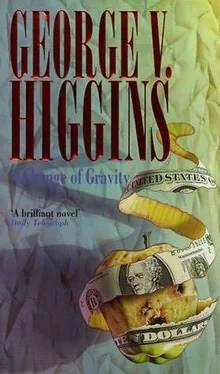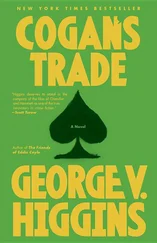George Higgins - A change of gravity
Здесь есть возможность читать онлайн «George Higgins - A change of gravity» весь текст электронной книги совершенно бесплатно (целиком полную версию без сокращений). В некоторых случаях можно слушать аудио, скачать через торрент в формате fb2 и присутствует краткое содержание. Жанр: Криминальный детектив, на английском языке. Описание произведения, (предисловие) а так же отзывы посетителей доступны на портале библиотеки ЛибКат.
- Название:A change of gravity
- Автор:
- Жанр:
- Год:неизвестен
- ISBN:нет данных
- Рейтинг книги:5 / 5. Голосов: 1
-
Избранное:Добавить в избранное
- Отзывы:
-
Ваша оценка:
- 100
- 1
- 2
- 3
- 4
- 5
A change of gravity: краткое содержание, описание и аннотация
Предлагаем к чтению аннотацию, описание, краткое содержание или предисловие (зависит от того, что написал сам автор книги «A change of gravity»). Если вы не нашли необходимую информацию о книге — напишите в комментариях, мы постараемся отыскать её.
A change of gravity — читать онлайн бесплатно полную книгу (весь текст) целиком
Ниже представлен текст книги, разбитый по страницам. Система сохранения места последней прочитанной страницы, позволяет с удобством читать онлайн бесплатно книгу «A change of gravity», без необходимости каждый раз заново искать на чём Вы остановились. Поставьте закладку, и сможете в любой момент перейти на страницу, на которой закончили чтение.
Интервал:
Закладка:
When she was by herself there were none of those official silences she really didn't like. She was nicer than most of the people who had called her in over the years: when she asked a question, she was polite enough to acknowledge it, at least with a shrug.
Merrion gazed at Janet and wondered idly where the two of them fitted among the planets and the stars onto the infinite curve of the universe, and why it had become necessary that from time to time they occupy adjoining places.
"My front window," Janet said. "You just can't help it, noticing things, you've got a window like that." Her third-floor unit, number 14, sitting atop number 7 on the second floor, number 1 on the first one bedroom, bathtub with shower, small kitchen, living-room dining-room combo had a picture window over-looking Eisenhower Boulevard. "Sixteen-ninety-two Eisenhower Boulevard."
She said it somewhat ruefully but defiantly, too, almost proudly, as though aware that the address conveyed a kind of raffish distinction Merrion would recognize. "You must know something about where I live.
You got me in there, didn't you? Right? I've got that part right, haven't I?"
She had it right. "I got you in there," he said. "I called the super for you, what, almost a year ago now. Lucky for you, that one unit was open and the guy owed me a favor, something I did for his kid."
That was all true. Merrion had sidetracked Steve Brody's damned kid safely away from a crack-cocaine prosecution into a private, long-term, residential drug-rehab program run under a state contract in Stowe, thus sparing the kid a criminal record (for the time being, anyway, Merrion'd thought, not expecting much more than that) and opening up the apartment where Mark'd been living with a girlfriend as useless as he was. But it wasn't all of the truth. Among the many other things Merrion knew about that building was the fact that the Town of Canterbury on the last business day of every month by check drawn on the Canterbury Trust Co. disbursed $385 in public funds payable to Valley Better Residences, co Canterbury Trust Co." Canterbury, Massachusetts, in full payment for the coming month's rental of that apartment to Janet LeClerc (until the town had changed over to direct deposit of payments to vendors via electronic transfer, the cancelled checks were returned to the town every month stamped on the back by the bank 'credit to account of Fourmen's Realty Trust Valley Better Residences').
Merrion's familiarity with the location went back almost a quarter of the century. The building was still new when he first visited it late in 1970, completed earlier that year. F.D. Barrows Construction, the same low-bidding jerry-builders that had constructed the new district courthouse thirteen years before, had put it up. The low-grade bricks were un weathered The cheap mortar of the pointing was neat, regular and even. The newness concealed the shabbiness for a while, but Merrion, cursorily inspecting it as he went in and out of it, once or twice a week three or four times if Larry had been having a bad stretch — week after week, looked on as the weather wore the mask off.
Larry had gone to the cheap brand-new place to die. The whole world itselfd been pretty new then, as far as Merrion'd been concerned. He contemplated it and he saw that it was good. It looked to have been much better built than 1692 Ike, and at the age of thirty he had reason to believe he was soon going to have it on a string.
THREE
Merrion visited Lane the first time on Saturday, the day after Christmas, bringing a holiday fifth of Old Granddad. It was one of three Christmas bottles from lawyers allocated to each of the three assistants by Richie Hammond. He reserved both big baskets of fruit from abstemious attorneys balancing their strong beliefs in temperance against their disinclination to lose their ready access to continuances of cases for which clients had not paid and forgiveness for late filings and the other nine jugs for himself. Protesting the injustice to Hammond by reminding him that Lane had split the take evenly, Merrion had learned by chance that Larry was living alone. "Yeah,"
Hammond said with satisfaction, locking up the office at 2:00 P.M. on Christmas Eve and collecting the last of his gift parcels from the oak bench beside the door. "Thought being generous one day a year'd make people forget what a bastard he was all the rest of it. And what did it get him? Not much. Now he's up there by himself on the boulevard, all by his lonesome, gone and forgotten as well."
"What the hell're you talking about?" Merrion said. "Larry's got a big family, six or eight kids. He lives with his wife down in Indian Orchard in the same little house they raised all those kids in. "One bathroom and ten people trying to get in it."
"Well, his family got wise to him," Hammond said gaily. "Told him either he hadda lay off a the grog, or go live by himself somewhere else. Serves the prick right, you ask me."
Merrion had felt sharply embarrassed not to have found out earlier. He had not made any effort to contact Lane in the month that had passed since Larry, having no choice in the face of Carries family power, had turned the chief clerk's job over to Richie, going on what was called terminal leave the week after the four-day Thanksgiving break. He thought it strange that Larry had not telephoned him either, but knew guiltily that did not excuse his own omission. Initially suspicious, as he was of everyone, Larry after a year or two of daily scrutiny had accepted Merrion as 'a fairly decent guy, once you get to know the kid, make allowances for him," and made him his office protege, teaching him what the job really meant and entailed, grooming him someday to take it. To Hilliard Merrion admitted: "I owe Larry. I should've shown more respect."
When the court had opened with Larry as its first clerk, the title of magistrate was not included in the statutory definition of the office that he held. But that was in fact the job he had soon begun to do, years before the law was changed. He had started exercising magisterial powers when he and Charles Spring, the first judge to preside in Canterbury, soon after taking office deduced that Spring's job would become a lot simpler and less time-consuming if the judge informally ceded to his more-than-willing clerk and comp licit fellow-investor enough actual power to decide de facto Small Claims civil matters applications for summary process brought by landlords, tradesmen and public utilities against people who had failed to pay their bills. Lane began to hold what he and the judge called 'preliminary screening hearings," putatively to enable the judge to conduct 'official sessions' more expeditiously, 'saving everybody's time."
The bill-collectors immediately perceived that this procedure was by far the quickest, surest and most efficient way to get judgments against stubborn debtors. They learned to agree to allow "Judge Spring to decide the case and sign the judgment on the basis of the memo I'll write up of this session, and then after you've seen his ruling, if you have no objection, he will sign a judgment. If you do have an objection, all you'll have to do is state it and he'll hear the case."
If within three days neither party entered an objection to Lane's memo, a judgment tracking the content of the memo was entered on the docket, carrying the "Chas. Spring' signature Lane had expertly forged.
When there was an objection, experience soon demonstrated, the judge, after rather brusquely holding the full hearing requested by a disappointed litigant tended to decide the case against that party, disappointing him again. As that understanding gained currency, the formal debt-collection process became even speedier in the Canterbury District Court. The grateful lawyers thought it fitting to be openly generous at Christmas and eager to pick up bar-tabs when they saw Lane in The Tavern after a hard day on the job.
Читать дальшеИнтервал:
Закладка:
Похожие книги на «A change of gravity»
Представляем Вашему вниманию похожие книги на «A change of gravity» списком для выбора. Мы отобрали схожую по названию и смыслу литературу в надежде предоставить читателям больше вариантов отыскать новые, интересные, ещё непрочитанные произведения.
Обсуждение, отзывы о книге «A change of gravity» и просто собственные мнения читателей. Оставьте ваши комментарии, напишите, что Вы думаете о произведении, его смысле или главных героях. Укажите что конкретно понравилось, а что нет, и почему Вы так считаете.











